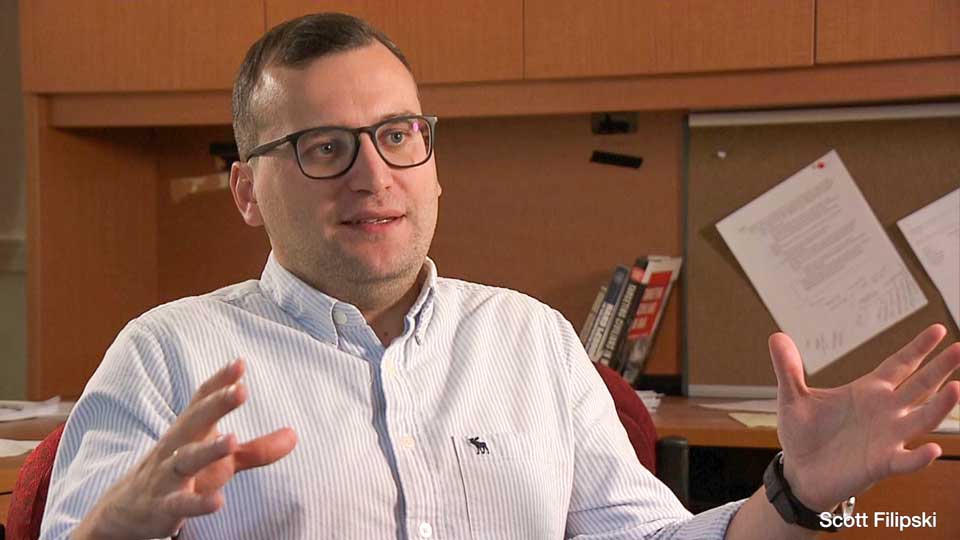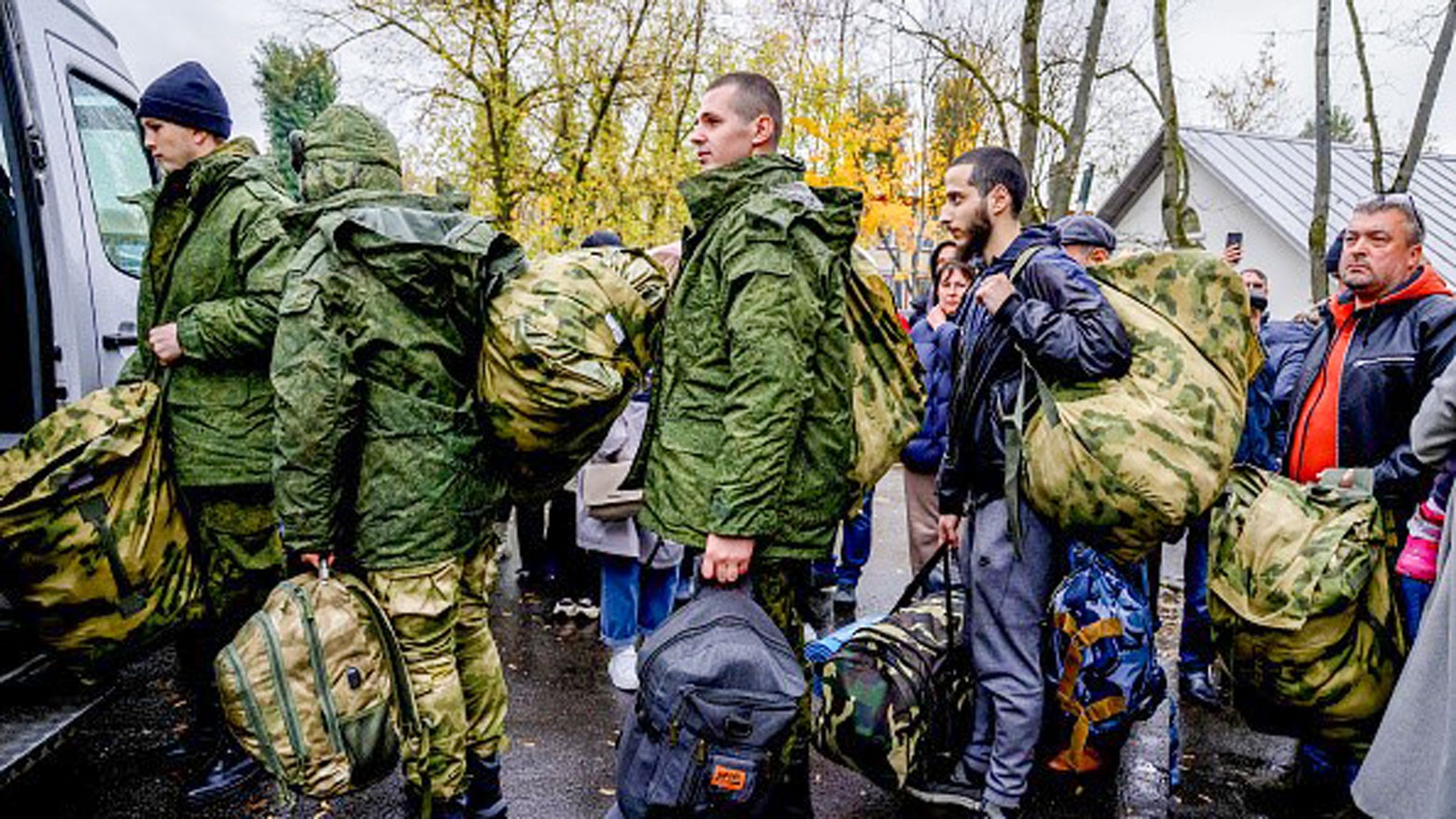Luzin had previously taught at Perm State University and Ural Federal University in Russia, and served as a consultant to the presidential campaign of dissident Alexi Navalny in 2018. In his newly assigned, still-bare-shelved office at the Fletcher School at Tufts University, he shared his thoughts on the mobilization, the state of the Russian military, Putin's nuclear threats, and his vision of what an appropriate end to the conflict would look like.
The following is an edited and condensed version of our interview.
Democratic mobilization vs. authoritarian mobilization
SCOTT FILIPSKI: How do you assess the mobilization?
PAVEL LUZIN: The current mobilization is completely unsuccessful. It is increasing chaos within the Russian institutional system, and when the government increases chaos instead of increasing order, it is a disaster.
I don't believe that it is possible to transform this crowd of mobilized people into effective armed forces, into soldiers. We may compare the mobilization in Ukraine which is a mobilization of a democratic republic, where the armed forces and the government rely on the people's will to fight to defend their homes, defend their families, and where the supply chains of the armed forces rely on civil society. A lot of Ukrainian businessmen, a lot of civil activists, support their army. They provide their army with food, with uniforms, with equipment, with helmets and so on. This army is effective.
The Russian Federation is not a democratic republic; it is an authoritarian state. And that's why it is trying to realize the authoritarian type of mobilization. This authoritarian type of mobilization still relies on violence, on force, and the increasing level of violence will create an increasing level of counter-violence, of resistance.
Many Russians emigrated. About one million people, or several hundred thousands of them, emigrated from Russia, but even if the Russian government tries to prevent people from further emigration, people will try to resist in some other way. They will use Molotov cocktails, they will burn the recruitment stations, and it is already happening.
Russia is trying to escalate the situation in attempt to force Kiev, Washington, Brussels, to force them to start the negotiation process. But the mobilization, this sabotage of gas pipelines in the Baltic Sea, this nuclear blackmailing, the capturing of nuclear power station in the Zaporizhzhia region -- this all creates escalation. But at the same time, this is only prolonging the agony because it's impossible for the Kremlin to win this war.

It's the political economy, glupyshka
FILIPSKI: Why?
LUZIN: In 2019, it was evident that the Russian Armed Forces were going to war, but they were unprepared, unprepared for a massive war. Already then, we saw the lack of command and control communication systems, the lack of intelligence and reconnaissance systems, like the crucial deficit of satellite reconnaissance and imaging.
We also saw a degraded military education system, together with the whole education system in Russia. And people who were going to become officers, especially officers of the ground troops, airborne troops, or Marines don't get a good education, and don't learn how to educate themselves, so that when they deal with advanced military equipment, with advanced arms systems, they don't know how to use them in an effective way.
Military officials published articles in Russian Ministry of Defense journals in recent years who said, OK, we have some advanced systems, but we don't have very well educated officers to deal with the systems, and of course we don't have good sergeants and soldiers.
But the Russian generals believed that the amount of arms would be enough. If you have thousands of tanks and several hundred combat aircraft and several hundred helicopters, it will be enough. The quantity is quality itself. This was the main general presumption, but it was a wrong presumption because the quantity of arms did not transform into quality of warfare.
So this is not only the problem of the Russian armed forces. It was a problem of Russian authoritarianism and the Russian political economy system. Because, since 2014 and the annexation of Crimea and the war in Donbas, the Russian defense industry has faced sanctions from the United States, the European Union, and from Japan. As a result of the inability to work with foreign companies, we saw the degradation of the Russian defense industry.
So without education, without a sustainable economy and an efficient defense industry, you just have some amount of people in uniform, some old fashioned organizational structures, and you have military officers who act like bureaucrats, not like military officers.
That's the main reason and the main cause of why Russia presented itself so badly on the battlefield. The other problem is that the original purpose of this war was impossible to realize.
FILIPSKI: Why was it impossible?
LUZIN: It's impossible to capture a county of 40 million people with a huge territory, developed industry with an urban population. Seventy or 75 percent of Ukrainians belong to the urban population. It's impossible to capture alone, without any coalition.
We may compare this with the war in Iraq in 2003. It was a coalition of 50 states against a country of 25 million with a relatively low level of urban population, with a relatively low level of industrial development. And even considering these factors, this campaign was successful in the first several months but then became a disaster.
Russia then decides, "No one has such experience, but we will achieve this purpose and capture the biggest European country and we will capture it by ourselves. All the cultural differences don't matter, the Ukrainians' will to fight doesn't matter."
A couple of weeks before the aggression, unofficial representatives of the Russian armed forces, some retired officers, generals, colonels, warned the Kremlin, "No, we shouldn't start this war at all because this war is impossible to win." But the Kremlin decided not to care about these warnings, and moreover the Kremlin does not trust its military officers, its generals. The Kremlin trusts security officers, FSB, FSO, some in military intelligence, (Chechen leader) Ramzan Kadyrov. Kremlin trusts them, not the generals.

Becoming an irregular army
The Russian armed forces are degrading. They are transforming from a regular military power into an irregular force like Hezbollah, like the Taliban, like ISIS. They are already using Iranian drones that were developed for these groups like Hezbollah, for the Houthis in Yemen, and so on. So the Russian Armed Forces are acting not like a regular armed forces, but like an irregular terroristic movement. They strike against Ukrainian citizens and so on. So what will be the result? Where is Russia as a sustainable state at the end? I'm afraid that we will see a lot of troubles within Russia.
What I see is a deep political crisis in Russia currently because their legal institutions are paralyzed. The Russian armed forces, as a legal institution, is also paralyzed. The Kremlin is relying on irregular troops, irregular forces and mercenaries. That's a problem, because a regular state cannot rely on irregular practices and irregular forces. It's a kind of suicide for the regular state.
Also, I see that the sanctions -- this technological embargo that's imposed on Russia -- will kill not only the Russian defense industry, it will also kill the Russian oil and gas industry and many other Russian industries. Because without European, American and Japanese industrial equipment, many of the Russian industries will not survive.
Russia will be incapable to maintain its manufacturing. My favorite topic is the Russian space program, but it will not survive. It's impossible to realize the space program itself without any international cooperation.
So, Russia without advanced industries, Russia with paralyzed institutions, Russia with a shocked society, Russia with a scared society, Russia with a degraded educational system -- taking into account these factors, there is no good prospect for Russia at all.
How the conflict should end
The only good prospect for us right now, if Vladimir Putin will die somehow tomorrow, the day after tomorrow, this war will be stopped. Russia will sign an agreement and pay reparations for next 100 years, restore a market economy with market economy institutions, and restore its cooperative ties with the West, with Japan, with the United States. But how to restore these ties in face of the fact that Russia is not a trusted partner ?
So to show that Russia is a trusted partner, Russia must demilitarize itself. But we never saw an example of self-demilitarization. Only occupation may help Russia to demilitarize itself. I am not kidding. Look, we remember the occupation of Germany and we remember the occupation of Japan.
Russia after the collapse of the Soviet Union, after the collapse of totalitarianism, was never occupied, and Russia was not successful in its post-totalitarian transformation.
FILIPSKI: Although it's hard to imagine an occupied Russia...
LUZIN: It's hard, yes, but a couple of years ago we were not able to imagine that Russia will start a war in the heart of Europe with tens of thousands of losses of troops. The intensity of this conflict is like the Second World War. Much higher than it was in Vietnam, much higher than it was in the Soviet invasion in Afghanistan. Much higher than during the wars of the Persian Gulf. Everything is possible, everything is possible.
And if we can imagine that China will try to capture Taiwan, that China will try to capture islands in the South China Sea, that China will try to capture somewhere else among its neighborhood. Why can we not imagine a situation where Russia will be occupied? Especially if Russia is going to use a nuclear weapon.
Nuclear threats
FILIPSKI: How should we approach Putin's nuclear threats ?
LUZIN: There is a possibility that Russia will use nuclear weapons, and the probability of this is higher than it was in April or in August. Today, the probability is higher. But we shouldn't be afraid of this. Because if Russia will be successful in its nuclear blackmailing, tomorrow North Korea will blackmail Japan or South Korea, and the day after tomorrow Pakistan will blackmail someone with its nuclear weapon, and so on.
I hope that the West has a plan in case the Kremlin uses nuclear weapons, and the plan is punishment of Russia and the Kremlin, not in giving up. I hope that people will not be afraid, will not be scared, because our fears, they are paralyzing us. We shouldn't be scared. We shouldn't give up in the face of a bloody, crazy dictator. There is no other way. You cannot negotiate with terrorists. You cannot give a terrorist what he wants.
I think that we all should study history. And we all should have our morality and moral conditions in a good order. We shouldn't be afraid because Putin is not the first crazy dictator in this world, and I'm afraid he's not the last. Yes, he has a nuclear weapon in his hands, but nevertheless, I believe that we will survive and we will learn from this, and we will be able to make this world better and safer place. I also believe that we Russians will be able to repair our faults, our crimes that we conducted against Ukraine and that we will be able to pay for this, and be able to be back into the international community as a trusted people. I hope for that.

